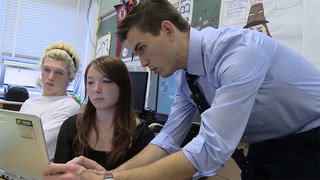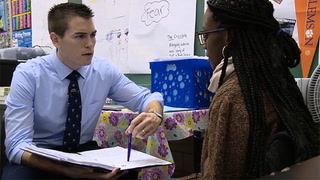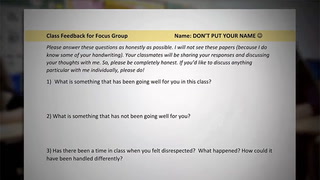Making Learning Personalized & Customized Transcript
Speaker 1: Last year, I had this wonderful gift of a year to reflect on education and my own practice, to learn from other great teachers and a look at what other models were out there. The whole time I'm thinking about when I come back to my classroom, how I wan it to be better.
All right, if you're just coming in, grab a computer and have a seat please.
My Getting Better Together project this year is to create learning for students that is more personal to them, more based on their interest and their curiosities and the feedback and learning they get to move them along in continuum is more customized to them and their needs.
Our focus is to continue to think about how do we pursue justice and a big piece of that ...
When I thought about coming back to the classroom, I thought how can I have structure that allows for students to work in different content areas all at the same time.
We're going to break into workshop in just a second here.
For me, a workshop model allows a student to make choices around content while we're still unified in our workaround skills.
Prison reform, you're going to hop over there in just a second.
Last June, I gave the students a survey and I chose current event issues that are prevalent in the news and I also offered them other and said, "You tell me what you all care about and we'll try to build a class around that." It was their voice that brought those topics up and then I spent some time building some resources to help their research.
[crosstalk 00:01:34]
Let's talk about and share some key ideas.
The lesson you're about to see today is a full workshop model.
Where is their main idea?
First, the mini lesson at the front helps with skills around reading informational text.
What were they doing up here with these other ideas?
Speaker 2: Right there, they were like, I guess they were showing the opposing ideas.
Speaker 1: Then what did they do after that?
Speaker 2: Then they ...
Speaker 1: As their reading articles and doing their research, I want to make sure they're also building their skills around identifying key ideas in details.
What are they doing here?
Speaker 3: They give you counter examples.
Speaker 1: Right and what do they do the rest of the article?
Speaker 4: They prove them out.
Speaker 1: Think about that as the technique. They lure you in, then once they say this is how it really is, how do they support that? What are the key details?
One option that you'll have in workshop is try to apply this way of thinking to an article that you're reading for your topic.
Then the next step, soon as we'll go to different stations within their workshop.
All right, go ahead.
Speaker 5: What kinds of jobs are people with major criminal able to get?
Speaker 1: Some will be interviewing, someone who's working on the social justice they've chosen.
Speaker 6: How about we tell this side of the story?
Speaker 1: I had students who were preparing to interview someone who worked for an organization helping refugees here in America. Others will be working on continuing their research on a topic of their choice and I had students who were working with me in a small group to work on a targeted skill. Then finally, some students working on creative writing. They haven't selected these groups. They selected topics and then those topics became mixed groups.
You should be able to walk through this paper, just follow this direction. Some of this you'll do independently and then some that you'll do together as a group.
When students go to each of these places, there is a protocol given to them on an assignment sheet and so I don't have to be present with them and walking them through it step by step.
[crosstalk 00:03:32]
Speaker 7: Another main thing you can do is just raise awareness so that other people who have the ability to do stuff like that can. You can always try making a YouTube channel.
Speaker 1: The work that students are doing now is going to culminate in a few pieces. One is an awareness campaign to help shed light on these social justice issues. The other piece is a service project and that's going to need to be a coordinated effort.
Speaker 8: Try to get a view of someone who actually experienced it, not just trust what the internet says.
Speaker 1: I think it's a combination of seeing work that goes out and lives in the real world, as well as developing their skills. That, combined with topic choice, really allows them to apply their own talents and interests and curiosities to their learning.
Did you look at the models of the creative writing?
Speaker 9: Yeah.
Speaker 1: Okay and you feel like yours is in line with the models?
Speaker 9: Yeah.
Speaker 1: Okay.
Something that I am working toward and something that I think is key to facilitating more self directed learning is by including and being more definitive in success criteria for students. I think the best example I can give is with their creative writing assignment. On the WIKI are three examples of an excerpt from creative writing that I've written in student voice.
All right, so we're looking at this first example here which ...
I provided a voiceover talking about how each one does or does not meet the success criteria to really give students a concrete example for what they're looking for in order to be successful.
Think about all of the intentional choice in words and phrases that go into creating a sentence like that.
It really is quite an interesting process to try to figure out how do I set students up for success in the process, but also in the product.
You're interviewing Danielle McGregon.
Here in the first few days of this model, I don't want to stress students out with so much change also around a pile of work that is due, due, due, due.
Is that the one you're trying to get to?
Speaker 10: This one right here.
Speaker 1: I think it's okay to let kids settle into this type of work and make an adjustment to it and then once we're used to this kind of work, then hit the accelerator.
Speaker 11: I think we should start with social service director, what do you do for the company.
Speaker 1: I had a group of students who selected the topic of criminal justice reform. The students read some press that they've gotten around their work and about their organization and they formed questions.
Speaker 12: If you're good, I think they're ready to just start hitting you with some questions.
Speaker 13: Yeah, absolutely.
Speaker 1: Students make sure they're able to negotiate those terms of prioritizing which question and is it based on who or is it based on the quality of the question.
Speaker 14: What do you specifically do for the company?
Speaker 13: Yeah, the company I'm working for right now is called Work Pittsburgh. It's a construction company that hires people with criminal backgrounds and ...
Speaker 1: Today was our first interview. I didn't how that was going to work, if it was going to work and what that would look like. I'll go back and listen to their recording and reflect with the students afterwards and that will inform how we'll get the next group ready for their next interview.
Speaker 14: How do you counsel felons into not recidivating?
Speaker 13: Yeah, great question.
Speaker 1: There is success criteria around being ready to be prepared for the interview and there's also look-fors. I'm looking for students asking follow up questions. That shows active listening.
Speaker 14: Do the criminals ever relapse while on ...?
Speaker 1: They actually went twice as long as he had originally committed to, so that's a sign that it was going well.
Speaker 13: I'm going to turn the camera around. Here's the factory. This is the house we're working on right now. It's coming along really nice.
Speaker 1: What a great moment for kids to see the reform that they are researching and working for and raising awareness for live and in action and I think that's a priceless moment for a Tuesday in high school.
Speaker 13: Thanks so much.
Speaker 1: Appreciate you.
Speaker 14: Thank you so much.
Speaker 1: All right.
Speaker 13: Best of luck.
Speaker 1: Cool.
Speaker 14: Did you see how it works? [crosstalk 00:07:24] They work so hard.
Speaker 1: Yeah, they wanted you to know they work hard.
Speaker 14: I'm so proud of them.
Speaker 1: That's good to hear. Think about this in the context of what you're reading and researching. How can we tell that story to people? How can we make them aware that the way think about criminals and prisons maybe isn't the whole story?
In all this work, the kids are working toward the standards.
Speaker 15: You need to do anything ...
Speaker 1: Kids are working on speaking/listening. Kids are working on their writing skills. Our mini lesson today was all about reading informational text. These skills are what drive all of our work.
The key for your interview prep is to think about I'm learning about this piece of this issue and I have these questions that I'm pursuing. Where do those two factors cross? Does that make sense?
Speaker 14: Yes.
Speaker 1: Okay.
Speaker 14: You have to do research on this first and then we come up with questions to ask around how we can do it as students.
Speaker 1: What I'm looking for in any given class within this model is for students to be authentically engaged and making progress in their learning, enough that I'm able to give my attention to small groups of students in targeted ways that can really help them close gaps while other students are still continuing to make progress.
Your topic is?
Speaker 16: Refugees.
Speaker 1: Can you maybe write a sentence where you include the definition of a refugee?
I had students, who in a previous piece of writing, had used some domain specific terminology without defining it for the reader.
Speaker 17: A refugee has something going on in their country, like a war or just crisis, like Syria.
Speaker 1: They're forced, right.
Last piece of practice, can you maybe write a sentence that you might use in a blog post?
Speaker 17: Okay.
Speaker 1: At the same time, there was one student who opted into a conference because she wanted support with her writing.
Right now you're doing some research around race. Let's talk about this question you have. I don't know what this is and you need to make a point because overwrite. Explain this to me a little bit more.
Speaker 17: When you try to write an essay, I don't know [inaudible 00:09:27] kind of writing everything.
Speaker 1: Every idea that comes to mind, okay. Let's try to talk about some concrete terms.
Having a structure that is flexible, that allows students to make their needs known when the writing is so fresh and the mistake is familiar. It's so important to try and fill in and close that gap in that moment. For that small group of students, I think that that certainly happened.
Also what you did here that's great is that you said about the commas, that parenthetical statement of yes.
What I was able to see was students revise that writing so that it was evident and I saw them transfer that skill to a new piece of writing.
It did take a lot of time, so it took time that students weren't making progress on their projects, but I think as I get to all students that that will even out.
Speaker 18: How can we help separate the refugees from the view points of ISIS and ISO?
Speaker 1: There is always the question, if I'm not with them, are they on task, but at the same time even though we're a whole group, are they on task? Are they authentically engaged? Right now I am erring on the side of giving students a choice and trust and ownership in what they're learning is more likely to produce meaningful, authentic engagement, then my decisions around task and time. More might get done, but what value is that? Does that leave students wanting to learn more?
When we fill out this workshop log, can we try to be a little bit more detailed in not just telling me what you did, but how it went?
Toward the end of class as I'm collecting workshop logs that will give me a reflection and feedback on the progress they have made for every student.
Did it make you think about what you're going to research next at all?
Speaker 18: Yeah.
Speaker 1: How so?
I think I want to continue to work through this tension of students saying today "I'm going to work on" and "Here's how it went" and push them to give me a couple of look-fors for the next day. Tomorrow I'm going to work on this and I want to get this accomplished and then how far did we get. How are we going to really pace ourselves? I'm thinking right now about maybe some backward mapping from due dates at this point. Say we've had some days to really get into the learning and work that process, now what needs to happen in the interim to get you there and help you really think about managing your time because time management is really something that's really important for this model to work.
What do you do next? Research?
What happened today was great. It's what I'd been hoping I would see for months of thinking and planning.
Good job.
To put all those structures in place, all around thing they have chosen and things that matter to them, I wish I was in a high school class like that when I was 15.














24 Comments
IFNAN DEWO Oct 10, 2020 2:03pm
I like the way Mr. McComb has successfully engage all students and encourage them to work for higher achievement and to the standard. His workshop staion technique looks working perfectly. Everyone in each group has voice and choice. The fact that students share ideas and work collaboratively in a group, which each student is allowed to choose project topic are strategies that make Mr. McComb's student learn successfuly. I believe that his strategy for meaningful authentic engagement (for example students conducting real interviewing experts in the field of their topic) has enhanced self learning. I also like his assessment technique, which is based on real results of each student work and at the same time he gave credit to individual input in the process of conducting their project works.
I have seen in the past that students are interested and engage themselves in their learning when they are allowed to choose to work on topics of their individual interest. Sometimes, when planning group project works I give my students a list of topics to choose from and found out amazing results. Students take control of their learning enviroment and topic to work on. I will persue to use this strategy when teaching topics that are convinent for authentic student engagement.
lori diamond Jan 25, 2020 11:29am
This is a great video. It's clear that you have done your prep work. You know your students and are prepared to scaffold and give them enough support to have them feel successful. How many students are in your class? I am trying to figure out how to scale this for a class of gifted third graders. How can I create interest surveys and stations to support their independent learning. The younger kids need so much more support. But not all kids do, so how do I arrange for the independent learners to have the opportunity to do more?
IFNAN DEWO Oct 10, 2020 2:08pm
As you have said, in the video it is clearly demonstrated that the teacher acts as a facilitator by walking form group to group checking for student self engagment and providing support. I think such arrangement and environment gives more chance to encourage indepenent learning and at the same time encourage students to do more.
Nicolette Hagstrom Aug 20, 2018 10:26pm
Thank you so much for sharing this wonderful project and teaching strategy. I'm launching passion education projects this year and this gave me so many ideas! You did a fantastic job scaffolding the tasks and setting the students up for success.
Linda Whitmore Jun 4, 2018 4:48am
IFNAN DEWO Oct 10, 2020 2:10pm
I agree with you that as can be seen from the video, the teacher as a facilitator has great experience. Meaningull authentic students engagment can be observed here!
talal jawed May 4, 2018 4:14pm